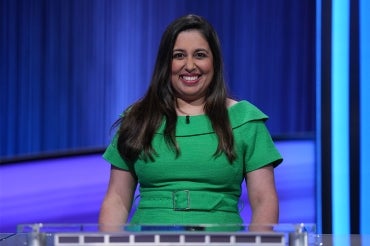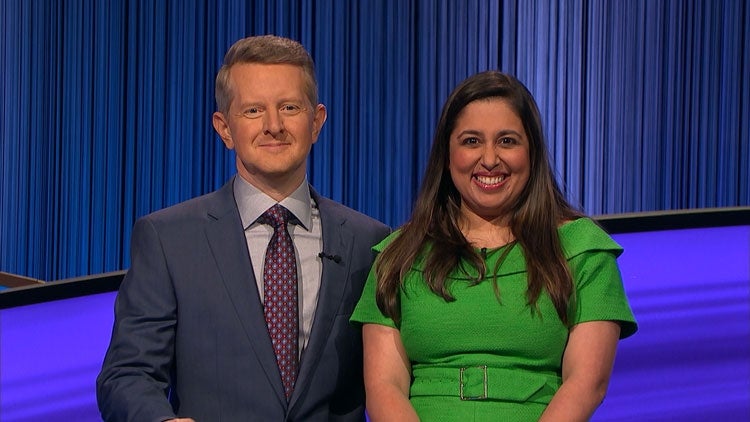Researcher Juveria Zaheer on how her day job prepared her to compete on Jeopardy!

Juveria Zaheer, pictured here on the TV game show Jeopardy!, is a clinician scientist at CAMH’s Institute for Mental Health Policy Research and an associate professor of psychiatry in U of T’s Temerty Faculty of Medicine (image via Jeopardy Productions Inc)
Published: February 22, 2024
As the medical head of the Centre for Addiction and Mental Health’s emergency department, Juveria Zaheer provides urgent psychiatric care to people in crisis and is a leading expert and researcher in best practices around suicide risk assessment and prevention.
She is also a trivia whiz, as evidenced by her recent appearances on the TV game show Jeopardy! – and a comeback success story at that.
A clinician scientist at CAMH’s Institute for Mental Health Policy Research and associate professor of psychiatry at the University of Toronto’s Temerty Faculty of Medicine, Zaheer lost during her first appearance on the show in May 2023 but performed well enough to be invited to compete in a Jeopardy! Second Chance tournament later that year.
Zaheer, a U of T alumna, won that competition and went on to play in a Champions Wildcard tournament, where she also came out on top. She will now compete in Jeopardy!’s Tournament of Champions, which begins airing Friday.
Having just wrapped taping of the tournament, Zaheer chatted with writer Heather McCall about her experiences on- and off-camera.
Many now recognize you for your Jeopardy! appearances, but can you tell us about your day job?
I work in the CAMH emergency department, which is the only stand-alone psychiatric emergency department in Ontario. It’s busy. When I started at U of T Psychiatry as a resident, we would see 350 patients a month. Now we see more than 1,500. I'm also the medical head, ensuring we provide evidence-based, dignified care to people in crisis. I’ve always said I have the best job in the world. It’s very rewarding to see people on the hardest days of their lives and provide them with comfort, dignity and support – and to be able to help connect them to the resources they deserve.
I’m also a scientist. My research focuses on suicide and suicide prevention. My team and I are seeking to understand the epidemiological underpinnings of suicide – the cultural and structural impacts within different populations – as well as biological and psychosocial determinants. We also do a lot of work around best practices in suicide risk assessment and co-create plans with participants on how best to support recovery.
Right now, we’re running a study looking at the experiences of people with suicidality during the height of COVID to better prepare for future pandemics. Another big investigation we’re working on – the first of its kind anywhere in the world – is a cohort study on people with suicidality across all ages, all diagnoses and all types of presentation. We’ll follow them for a year to understand them from multiple perspectives.
I’m proud of the progress I’ve made in research because people with severe and persistent mental illness are often excluded from studies, especially when they're experiencing suicidality.
How has your U of T education and training contributed to your Jeopardy! success?
I've always really loved people's stories, which is an important part of connecting with the people you treat. I applied this skill a lot during my residency. Apparently, an affinity for stories is common among trivia experts – there’s even a recent Scientific American article about this phenomenon. A former Jeopardy! contestant did a study and learned that trivia experts were most likely to remember facts in the context of a scene or a memory or an anecdote, and not through rote memorization.
Before I did my MD, I also completed three years of an undergraduate degree at U of T in the Faculty of Arts & Science through the Centre for the Study of the United States at the Munk School of Global Affairs & Public Policy. That foundational education was incredibly important in building up my knowledge of American history and politics.

What about in your current clinical practice and as a researcher?
As a physician, you learn how to manage and memorize a lot of data and to recall it very quickly. This is especially so in emergency settings. You also have to stay calm for your team and for your patients. You need to model that it’s a safe place. When you work in an acute care environment, you also need to respond to things quickly and pay attention to more than one thing at a time. All those skills have been very helpful.
One of the other things that being a researcher has taught me about life is variance. There is so much variance – so much randomness – in Jeopardy! There's a huge component of luck on this journey, so you can't get too high or too low.
Have your colleagues helped in your preparation?
When you film three tournaments in two-and-a-half months – and you have to be very evasive about where you're going and why – you need all the support you can get.
Aislynn Torfason is an emergency department psychiatrist whom I mentored. She's extraordinary and brilliant. Whenever I needed coverage for my administrative responsibilities she was right there. Paul Kurdyak was the emergency head when I was new at CAMH and we still work together. He’s been an incredible mentor and supporter – it’s a very tight-knit community.
Our pharmacist also shared a book on buzzing-in strategies with me. Others would quiz me on categories I was weak in. CAMH has also aired all my games on the big screen on our huddle board.
When I lost the first time, I was so worried about what people would say, but my colleagues only talked about how great I was. That’s made it easier to keep playing because I felt like I wouldn’t disappoint anyone, no matter what happened.
When it comes to your Jeopardy! success, how would you describe the balance between knowledge and the other aspects of game play?
When I got the call to appear on the show for the first time, I was so focused on acquiring knowledge that I didn’t think about anything else. I didn't think about how I was going to stay calm. I didn't think about betting strategy. I didn't think about the buzzer. I didn't think about how I would manage adversity. And I didn't think about my values.
So, I made a conscious effort during these last three tournaments to focus more on those elements. And I think having that sense of mental wellness or perspective really helped me play better. Everyone knows lots of stuff, but it's how you translate that knowledge into your performance that’s most important.
You’ve been cited by many fans as a role model – as a parent, a woman of colour, a physician and a fierce competitor. How does that sit with you?
It's such a flattering thing because I've had extraordinary mentorship in my career, and I know how important it is to have people to look up to. One of the things I wanted to show is that you can be good at Jeopardy! and also be a good mom, a good clinician and a good researcher. Of course, you can’t do all these things at once, but with the help of a good team and your family, you can have different experiences.
I also wanted to show my daughters that you can be brave and take chances – that you can fail in front of millions of people and it’s OK. You can be yourself and that's enough.
What from this experience will you take into your work and research?
I think my stress meter is now a little broken. The extreme, high-intensity experience of Jeopardy! has made academic presentations feel a little less scary.
But bigger-picture-wise? Since medical school I’ve been working non-stop building my career and building a research program. It’s hard work and sometimes it’s a slog. To be able to pick up a new hobby in midlife, to be able to take chances and to invest in myself, has been such a gift.
Also, as a mom to my two daughters – as well as the CAMH “emerg mom” as my team calls me – there are so many people I want to take care of. But I’ve learned it's not selfish to want to win. It's not selfish to do things for yourself. And it's never too late to make new friends and try something weird.



